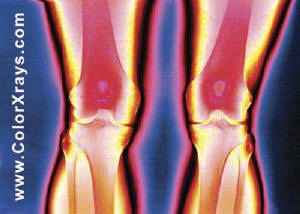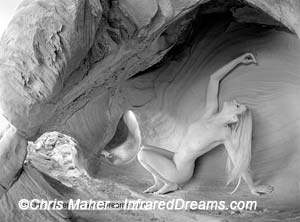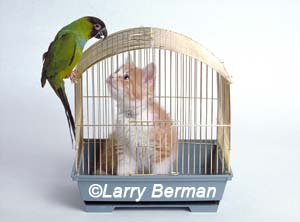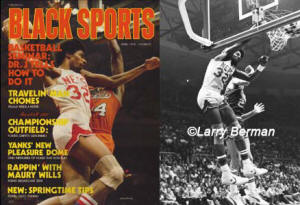Introduction
I have 30+ year background in photography and have spent much of that time
selling my photographs at fine art shows around the country. In
the past, to remain successful and continue to earn a living selling fine
art photography, Iíve been able to come up with bodies of work that
transcended the art shows and have successfully sold in other markets,
like posters, puzzles and greeting cards. Recent advances in technology
have changed my marketing techniques and now Iím able to promote myself
much more successfully using web sites and the Internet and can earn a
much higher percentage of my income through these new venues.
Overview of my photography background
In the mid 1970ís I photographed rock concerts and sports.
I became the staff photographer for the ABA New York Nets basketball team
and a contributor to the NBA programs. I was focused on treating
photography as a career and made sure to build as large a portfolio of
published pictures as I could. I started doing art shows which allowed me
to market my personal photography and earn enough of a living to quit my
ďday job.Ē I also picked up a stock agency to market my personal work, but
the art shows became my passion and Iíve been marketing my art through
that venue ever since.
Technology advances has changed marketing
possibilities
In July 1997 I purchased my first computer and my life
changed. I had always been one of those who disliked changes and was
afraid of computers, not seeing their real potential. Then we had a good
summer of art show sales and decided to take the leap into the future. The
more time I spent working at the computer, the less steep the learning
curve became. I Eventually started working with Chris Maher who later
became my partner, in creating my first web site. That was
BermanBears.com
for my successful teddy bear and baby animal line of photographs that
people used to line up to purchase at the art shows.
Believe it or not, the most successful line of
photographs Iíve ever sold at art shows turned out to be a dud on the web.
Iíve sold under $1,000 worth of prints since putting up that web site over
six years ago. What did I learn from the experience? I learned that
depending on the type of images, putting the pictures in front of people
on a weekly basis could be much better for sales than having them on the
Internet. I also learned that by not hanging the work in the booth, people
have no frame of reference when seeing the images on the web. I had
already stopped selling those images at art shows when we first started
building the web site, which turned out to be the main reason why it never
worked.
My next web site was
BermanArt.com for
my fine art photography. It did much better and generated an average of a
sale or two per month when I was doing art shows on a regular basis.
People see the work hanging in the booth and visit the web site after the
show, or use it to show their spouse. I learned something important here
also. The more you promote your web site in your booth on a weekly
basis, the more successful your internet sales can be. Make your domain
name into your booth sign and put cards out where people can take them
without feeling intimidated by having to ask for them.
Bringing the past into the present
Getting back to those sports photographs I took in the
1970ís. As technology changed, I now had a way to market those basketball
images that sat in a box in the basement for 25 years. I started scanning
the film in April 2003 and put up a web site at
BermanSports.com
to sell prints. I started running auctions on
eBay to make people aware of the photographs (and web
site) and the sales started from day one. Iíve scanned over 400 slides and
find that I can make good looking prints up to 20x30 from the best images.
In the first year I sold approximately 2000 8x10 prints and get an
average of three or four orders a week. In preparing my web site I
listed names of all the players from each picture on the page with that
picture and put a search box at the top of every page. Iíve used alt tags
under all the images and put relevant key words in the header and between
the title tags, the most important place for words on a web page. Last
time I checked, I
come up number one (or within the top five) on Google for most of the
players I have photographs of. With a minimum investment Iíve made
it into an extremely successful cottage industry. I print
postcards
to send out to all the people who have purchased my sports photos offering
a discount for a month to celebrate the anniversary of the
BermanSports web
site. The postcard is an annual event and hopefully will become
collectable. I even offer the remaining
cards for sale on eBay and the web site.
Using new technology to create and market fine art
Chris Maher and I wrote an article on shooting digital
infrared, which appeared in Shutterbug Magazine in early 2002. That led
both of us to explore different avenues and come up with successful bodies
of photographs. Chris started working with models and created a body of
nude infrared photographs which can be seen at
InfraredDreams.com
and I started experimenting with color filters and created a body of color
infrared photographs at
AlternatePhoto.com.
Iíve found that the strongest color infrared images are architectural
abstractions and have put together a body of work that is getting me into
some of the best art shows. In a slightly more commercial slant to my
technique, I photographed some x-rays on a view box at an orthopedic
surgeonís office and discovered that the resulting images had far more
reaching appeal. To capitalize on the interest theyíve generated, Iíve set
them up on their own web site at
ColorXrays.com.
Mixing old techniques with new technology to market
fine art
I'm experimenting with time proven marketing techniques to promote my
ColorXrays.com web site. Besides my Internet presence, I had
postcards printed with a strong image and web site URL on the front and
tried sending them out to orthopedic surgeonís offices throughout
the country coordinating with the locations of the art shows I was doing. I also created a
free screensaver of my color x-ray images that promotes the web site. The
orthopedic industry is just the tip of the iceberg of the medical field
and that there might be no limit to the amount of people who would be
interested in purchasing my photographs, if I market them properly. I've
also put a mailing list form on the web site to take contact information
of anyone interested in future purchases. In the first mailing of 1400
postcards, which contained 400 targeted to the locations that I was doing
my first two shows with the work, the result was uninspiring to say the
least. Not one person showed up mentioning the card and I only got a few
web site sales. But the pictures do sell successfully at the shows and
have generated other opportunities for me. I still try and do as many high
profile shows as I can get accepted to, but have stopped taking contact
information as I feel it's more work than it's worth.
How the Art Shows give me exposure that the Internet
doesn't
The remainder of those initial postcards are being used instead of
business cards as a give away in my booth. The fact that people can walk
away with a 4x6 color image (and web site URL) has opened up doors for me
that were previously unavailable. I connected with the
Florida Chiropractic Association after the Winter Park show and
they made me their 2005 featured artists of the year and are using my
photographs on the cover of their magazines and trade show brochures in
exchange for giving me advertising space in their magazine. I've also
found that adding larger than normal photograph sizes to the
availability
page on the web site has generated follow up sales of very large
photos, larger than I carry to the art shows.
When I ran out of my X-ray postcards, I figured out how
to get unlimited free color
business cards (again using my strongest images) from the trim
area around my prints that I have made at Costco.
Print Promotion
Not one to let a promotional opportunity get away, I've taken the
initiative to try and reach other markets through free editorial placement
in a few publications. I do most of my printing at my local Costco on
their Noritsu printer which uses Fuji Crystal Archive paper, I had been
approached by a regional manager last year about the possibility of them
writing an article about my sports photographs for The Costco
Connection Magazine
because they like to feature people who Costco has helped their business
grow. Not wanting to wait any longer, I wrote the article myself and
submitted it in January. The piece describes how I get my sports photos
printed at Costco and how I market them on my web site. Within two weeks
they called to tell me that they are profiling my
BermanSports web
site on the Members Connection page in the April issue.
Another opportunity presented itself in
Art Business News.
I read in the January issue that they were asking for submissions to their
Emerging Artists section. I prepared a set of samples of my
color infrared
photographs with a cover letter and sent it off. I just opened the
March 2005 issue and found that they used one of my images on the contents
page and did a half page profile using three images. The best part is that
it's the issue being given out at Art Expo this week so it will be
circulated more than any other issue that they publish this year. It will
also make a great artist statement to hang in my booth at art shows and an
impressive addition to my art show resume, for the shows that request it
with their applications.
Conclusion
Iíve found that I love the technology for the opportunities
it has given me. Not being afraid of it, I open myself to learning
something new every day. Iím also hoping that people reading this will
understand how proper marketing can give you more of a chance of being
successful at earning a living from your art. Some bodies of photographs
can promote themselves on the Internet and require little work to be
successful and others will need to have more costly promotion techniques
used such as postal mailing besides web site promotion. To sell
successfully, you need to determine what is necessary to reach your target
audience.









